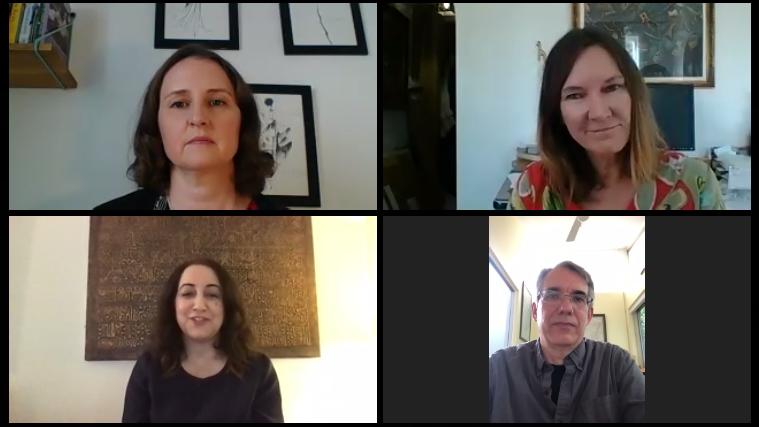As global refugee numbers reach all-time highs, Europe and the U.S. have increasingly sought to halt asylum-seekers at their doorsteps and deflect responsibility to other countries. The Pulitzer Center-supported reporting project “Outsourcing Migrants” by The Associated Press tells the stories of the individuals caught in limbo between fleeing persecution and finding a new home.
Last month, the project won the Overseas Press Club of America’s (OPC) Hal Boyle Award for the best newspaper, news service, or digital reporting from abroad. On May 27, 2020, OPC Governor Farnaz Fassihi interviewed three AP journalists from the award-winning team, as part of an ongoing series of Zoom conversations with this year’s OPC prize winners.
Fassihi discussed the reporting behind “Outsourcing Migrants” with team members Lori Hinnant, Tim Sullivan, and Julie Watson during an hour-long webinar. “The most important part about this series was that it focused on personal stories. We got invested in the people that they profiled, but they never lost site of the big picture,” Fassihi said during her opening remarks.
The conversation centered on the challenges of telling such a global story, and the journalists gave insight into migrant life within countries including Mexico, Honduras, and Libya. Despite the diversity of locations covered in “Outsourcing Migrants,” the team noted common threads that united all their stories.
“For us the issue was trying to capture what it meant to be stuck in this sort of immigration purgatory,” said Sullivan, who reported on a migrant camp in Honduras as part of the project. His team spent over a week living in the camp and learning about its residents’ lives, which were often marked by “excruciating boredom and fear.”
Sullivan commented on the resilience and comradery he witnessed within migrant shelters, despite many residents hailing from different countries and speaking diverse languages: “They did create their own little community there. Everyone knew the Congolese dad who was worrying all the time, everybody knew that Alphat the Ugandan was out running every day, everyone knew about Jennifer and her two sons who were hungry every night because she didn’t have relatives to send her money and the shelter only has two meals a day.”
The journalists also discussed the West’s complicity in creating abysmal conditions for migrants who awaited asylum. Hinnant reflected on the project’s investigation of abused E.U. funds and the failure of a U.N. migrant shelter in Libya.
“By the time we finished the reporting and had actually directly traced the European money to this militia leader who had himself been torturing and starving migrants, it was very clear that there was not oversight and when there was oversight people were looking the other way,” Hinnant said.
When asked about their stories’ impact on the public, Hinnant noted that UNHCR changed its policy on how to distribute E.U. money intended for migrants, despite lingering questions about implementation. Watson shared how after the publication of one of her articles, a group of doctors aiding migrants in Mexico received an influx of calls from volunteers.
Following an audience Q&A session, Fassihi asked the group how they were adapting to reporting during lockdown, and if and how they sought to continue exploring issues of migration. Hinnant stated how COVID-19 has left many migrants in an even greater state of limbo than before, with some “being stranded on boats in the Mediterranean [and] in the Bay of Bengal” and others “being kept in desert border areas in the Sahara.”
“[The pandemic] really takes the whole idea of the border policy one step further because there still are spaces that are between borders. There aren’t sharp lines and that is often where people are getting stuck,” Hinnant concluded.
